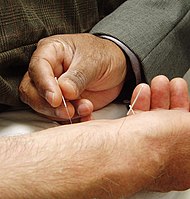
Photo from wikipedia
OBJECTIVE Despite the availability of well characterized and scientifically proven medicines, many people prefer the use of the less known herbal therapies that have no-scientific or evidence-based values as their… Click to show full abstract
OBJECTIVE Despite the availability of well characterized and scientifically proven medicines, many people prefer the use of the less known herbal therapies that have no-scientific or evidence-based values as their first line of treatment. While this represents a growing worldwide issue, it is commonly practiced in developing countries including Saudi Arabia. Hence, the aim of the present study is to assess the prevalence of herbal medicine use, the most reported side effects and influencing factors in Saudi Arabia. DESIGN A community based cross sectional survey study. SETTINGS Participants were recruited by convenience sampling method from local malls and family recreation sites. MAIN OUTCOME MEASURES Prevalence of herbal medicine use and the associated risks. RESULTS Out of the 1300 surveyed individuals, 1226 respondents (94 %) used herbal medicines for therapeutic purposes with the majority of the respondents using them based on traditional beliefs 699 (57 %) or family recommendations 417 (34 %). Young respondents <35 year olds who live in urban cities, showed a significantly better knowledge about herbal medicines use and the associated risks than their counterparts (p < 0.001). Despite the high percentage of reported side effects (46 %), more than half of the respondents 702 (54 %) use herbal medicines as their first line of therapy. However, the most reported reasons for the use of herbal medicine are the belief that they are safer, more effective and cheaper to buy than the standard medicines. CONCLUSION There is a high prevalence use of non-scientifically proven herbal medicine and a low level of knowledge about their risks amongst participants.
Journal Title: Complementary therapies in medicine
Year Published: 2020
Link to full text (if available)
Share on Social Media: Sign Up to like & get
recommendations!